Interpretation of the month
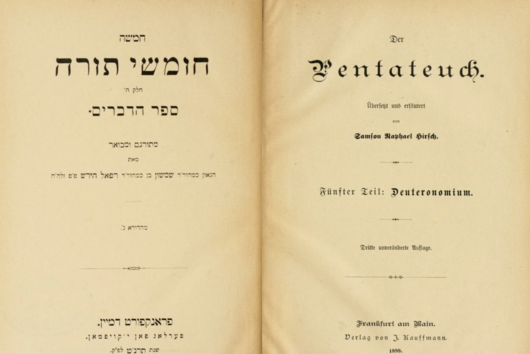
Interpretation of the month of Elul
Remember what Amalek did to you... how he met you on the road and struck your stragglers, all the weak ones behind you..
"You went on your way and had no reason to suspect an enemy attack. His attack was completely unprovoked, was driven by pure joy in man-slaughter, or by an inkling of the danger that began to threaten his principle of sword power from the principle of pure humanity and loyalty to duty that entered history with you ... So it was the weakest of the weak, who could not follow even a slow movement, whom he attacked. Thus, it was not weakness that invited him to pity and sparing, but to crude, mocking maltreatment"
Samson Raphael Hirsch on Deut 25:17f.
Interpretation of the Month of Av
You shall not contend with them, for I will not give you any of their land ..."Moshe had to utter all these warnings 'now' [i.e., at the time in question], lest they become fainthearted and say, 'If it is truly the will of the Holy One to give us an inheritance, and if He has the power to do so, why did He not expel the nations through [whose land] we passed?' - Therefore [Moshe] let them know 'now' that the Holy One did not want this to happen, for the Holy One had already allotted [these territories] to [these peoples], for it is written: ... because I gave the mountains of Seir to Esau for a possession (Deut 2:5), ... because I gave Ar to the descendants of Lot for a possession (Deut 2:9), and [the same applies] to the Ammonites, because I gave it to the descendants of Lot for a possession (Deut 2:19). [This was done] in honor of Abraham, to whom they were related, as he had done for Israel."
Rashbam (c. 1088- c. 1058) to Deut. 2:5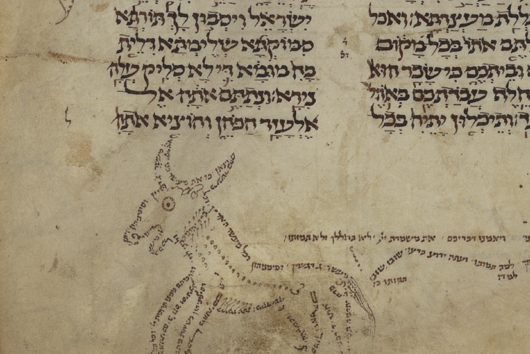
Interpretation of the month of Tammuz
This is the statute of the Torah (Num 19:2)
A gentile asked R. Yochanan ben Zakkai: "What you Jews [are] doing seems to be a kind of sorcery: a cow is brought, slaughtered, burned, ground to ashes and its ashes are collected. Then, if one of you is defiled by contact with a corpse, two or three drops of the ashes mixed with water are sprinkled on him, and he is told, 'You are cleansed.'" R. Yochanan asked the gentile: "... Have you ever seen a man possessed by the spirit of madness?" The gentile replied, "Yes!" "And what do you do with such a man?" "Roots are brought, the smoke of which is made to rise above him, and he is sprinkled with water until the spirit of madness flees." Then R. Yochanan said, "May your ears hear what your mouth has spoken; as this spirit [of madness] is, so is the spirit of impurity..." When (the non-Jew) had left, the disciples of R. Yochanan said: "Master! You pushed the non-Jew aside with a reed, but us - what do you answer us?" R. Yochanan said: "By your lives: Do not defile the dead, nor purify the [mixture of ashes and] water! Rather, it is the decree of the Holy One, may He be praised. The Holy One, may he be praised, said: "I have given a statute, I have made a decree - and you are not authorized to transgress my decree": This is the statute of the Torah (Num 19:2)."
Pesiqta de Rav Kahana 4,7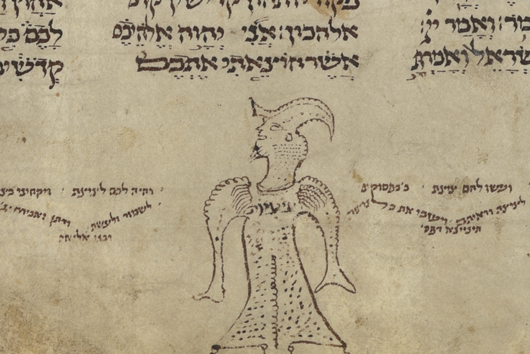
Interpretation of the month of Siwan
And if you reject my statutes and your soul abhors my judgments, so that you do not do all my commandments, so that you break my covenant, then I in turn will do this to you ..
And if you reject my statutes: one who despises others who carry them out; and your soul abhors my judgments : one who hates the wise; so that you do not do them: one who prevents others from carrying them out; all my commandments: one who denies that I commanded them. Therefore it is called all my commandments, and it is not called 'all the commandments'. That you break my covenant: one who denies the principle of Judaism [kofer ba-iqqar]. These are seven transgressions: The first brings about the second, and so on to the seventh, and these are they: [First] he does not learn, [then] he does not perform [the commandments], [then] he despises those who perform them, [subsequently] he hates the wise, [then] he prevents others from performing [the commandments], [then] he denies [my] commandments, [and finally] he denies the principle of Judaism ..
Rashi (c. 1040-1105) on Lev 26:15
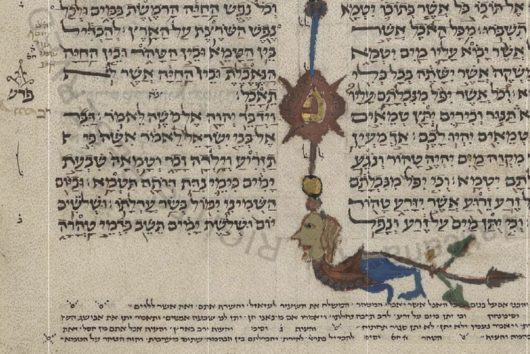
Interpretation of the month of Iyar
If a woman bears offspring and gives birth to a boy, she will be unclean for seven days, just as she will be unclean during the days of her menstrual period.
As for the meaning of the verse, the rabbis said: "ishsha ki tazri'a ['if a woman brings forth offspring'] - if the woman first 'brings forth seed', she will bear a son". The intention of the rabbis was not that the child should come forth from the woman's semen, for although the woman has reproductive organs like the man, no semen is produced by them, or [if it is produced] this semen is not viscous and contributes nothing to the embryo. Rather, the rabbis used the expression ishsha ki tazri'a ['when a woman produces offspring'] to refer to the blood of the uterus that collects in the mother at the moment of intercourse and mixes with the man's semen. According to the rabbis, the child is born from the woman's blood and the man's semen
Ramban / Nachmanides (1194-1270) on Lev 12:2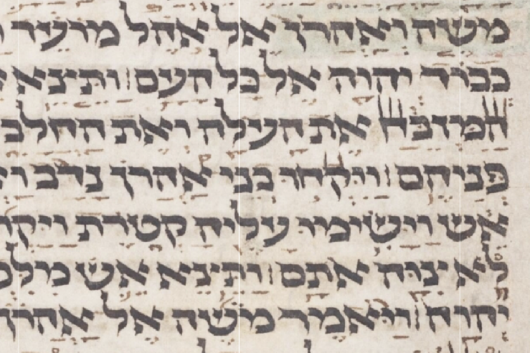
Interpretation of the month of Nisan
Then fire came out [ותצא אשא מלפני] from the Eternal and consumed [ותאכל] them [אותם]. And they died before the Eternal ותצא מלפני with gemaṭria [the sentence: 'the fire] proceeded from the Holy of Holies (1008)' [יצאה מקדש הקדשים]. ותאכל with gemaṭria gives [the sentence]: 'This [happened] with two [threads of] fire (457]' [זה בשני חוטין]. אותם results with gemaṭria 'This is the soul (447)' [זה הנפש]. אותם is written plene [with wav, numerical value: 6] because [Nadav and Avihu] sinned sixfold: they brought a foreign fire, they enacted a halachic rule before their master, they entered the sanctuary drinking alcohol, they left no children, they aspired to a position of leadership, and they did not seek counsel.
R. Ya'aqov ben Asher (c. 1269-c.1343), Ba'al ha-Ṭurim on Lev 10:2
"Remember what Amaleq did to you ..."
I have already mentioned the Midrash ... "You might think [that it means] 'in your heart'. But when it says in Scripture, 'You shall not forget,' [this already] expresses forgetting with the heart. What does [then] 'Remember' mean? That it [happens] through spoken memorization." ... But I do not know what this spoken remembrance [is supposed to mean] (...) The correct [interpretation] seems to me to be that the verse says that you should not forget what Amaleq did to us until we blot out his memory from under the heavens, and that we should tell our children and our generations, saying to them, "This is what the Evil One did to us, and therefore we were commanded to blot out his name." Similarly, in the matter of Miryam, we were commanded to make it known to our children, and to tell it to the generations (...)
Moshe ben Nachman / Ramban (1194-1270) on Deut 25:17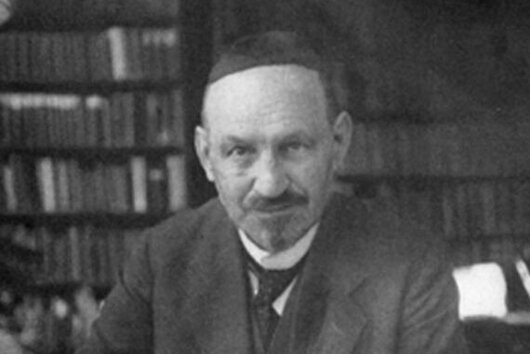
Interpretation for the Month Shvat
"Then God spoke to Moses and said to him: I am the ONE WHO WILL BE" (Ex 6:2).
But because Israel's present suffering is only a paradigm, the Name becomes an eternal promise (…) J-h-w-h is the future tense of the oppressed and afflicted. To the question, Will someone help? Will He save?—the certain answer of this Name is: "He will!" (…) This Name is the exclusive possession of Israel, its most precious treasure. It cannot be found in any other religion.
Benno Jacob, The Book of Exodus, Stuttgart 1997, p. 70
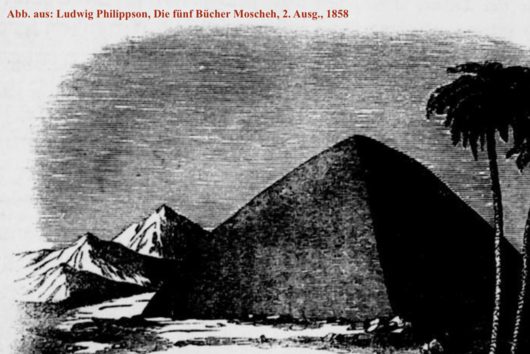
Interpretation of the month of Tevet
The Egyptians turned Israel's sons into slaves - with breaking severity: this was the second stage of the trafficking. Previously, burdens had been imposed on them "as foreigners" in the form of measures regulated by state law. But now they were declared to be slaves, גרות was followed by עבדות - פרך :בפרך occurs in תנ״ך only in פרכת, and accordingly the term "divorce" would appear to be the most natural. As through פרכת the most holy was separated from the least holy, so they completely separated the Jews from the legitimate part of the nation as completely lawless slaves, drew a complete wall of separation between themselves and them through the state of slavery in which they declared themselves. They were declared not to belong to the human species at all. The most ruthless harshness follows automatically from this
Samson Raphael Hirsch on Exodus 1:13 (The Pentateuch, Exodus, 1869)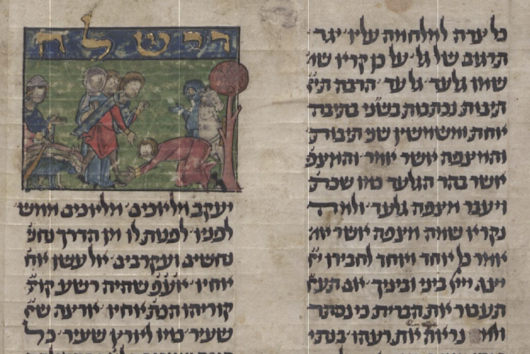
Interpretation of the month Kislev
"Then Jacob was very afraid, and he was afraid": He was afraid of being killed, and he was desperate because he might have to kill someone
Rashi on Gen 32:8 (and BerR 76:2)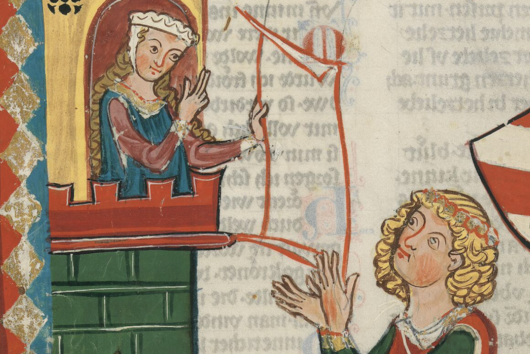
Interpretation of the month Cheshvan
And to Sarah he [Abimelech] said words of reassurance and comfort:
"Behold! When I took you at the beginning, I did not take you by force or violence, but according to the rules of marriage, for 'I gave your brother a thousand pieces of silver' as bride-price, thinking that he was your brother, as you had told me."
This bridewealth [mentioned here] was not the gift of sheep and cattle that Abimelech later gave to Abraham, but [it refers to the bridewealth] that [Abimelech gave him] before he brought them into his house.
"Behold, this is a covering for your eyes to all who are with you: The thousand pieces of silver that I gave your brother earlier are a great honor for you and serve as a covering for the eyes of all your relatives who are with you and for the whole world, so that they will not see you in a negative light and say, 'This woman - Abimelech treated her like fair game'"
All will know that he took her [as a gentleman] in an honorable way, and that he returned her against his will.
"And in everything, be you justified: It is common knowledge and well proven that I have behaved honorably towards you. Please keep [our encounter] only in good memory!"
This is the actual meaning according to the principle of "peshat", for Abimelech said all this only to honor Sarah, and not to rebuke or deceive her.
Rashbam on Gen 20:16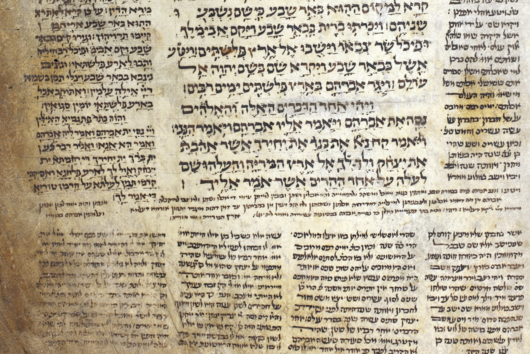
Interpretation of the month Tishri
And he said, "Take your son, your only one whom you love, Isaac...
Take [קח נא], ןis always an expression of supplication. He said to him: "I ask you to pass this test for me, so that it is not said that there was nothing real about the previous ones." Your son: Then [Avraham] replied: "I have two sons". He said, "Your only one". Then he said, "This one is the only one of his mother, and this one is the only one of his mother. He said, "The one you love," and he replied, "I love them both. Then he said: "The Yitzchaq". And why did [the Eternal] not reveal this to him from the beginning? So as not to confuse him suddenly; his mind could have left him and become confused, and to make the commandment dear to him and to give him [his] reward for every single word.
Rashi on Gen 22:2

Interpretation of the Month Av
You shall not quarrel with them, for I will not give you any of their land ...
"Moshe had to utter all these warnings 'now' [i.e., at the time in question] so that they would not become fainthearted and say, 'If it is truly the will of the Holy One to give us an inheritance, and if He has the power to do so, why did He not drive out the nations through [whose land] we passed?' - Therefore [Moshe] let them know 'now' that the Holy One did not want this to happen, for the Holy One had already allotted [these territories] to [these peoples], for it is written: ... because I gave the mountains of Seir to Esau for a possession (Deut 2:5), ... because I gave Ar to the descendants of Lot for a possession (Deut 2:9), and [the same applies] to the Ammonites, because I gave it to the descendants of Lot for a possession (Deut 2:19). [This was done] in honor of Abraham, to whom they were related, as he had done for Israel."
Rashbam (c. 1088- c. 1058) to Deut. 2:5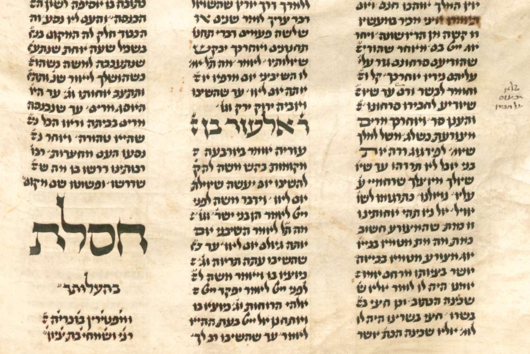
Interpretation of the month Tammuz:
This is what applies to the Levites: From 25 years old and upward he shall enter to do the work of the service of the Tent of Meeting "But in another place he says (Num 4:3) 'from 30 years old'. How is this to be understood? From the age of 25 he comes to learn the precepts of the ministry, and he learns 5 years. From (the age of) 30 he (then) performs the service. It is clear from this (verse) that a student who does not see a favorable omen [i.e. success] in his studies for five years will never see it"
Rashi to Num 8:24, par. בהעלותך